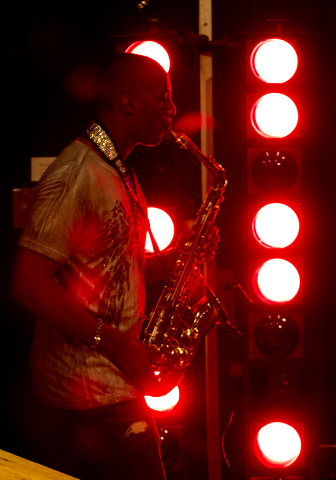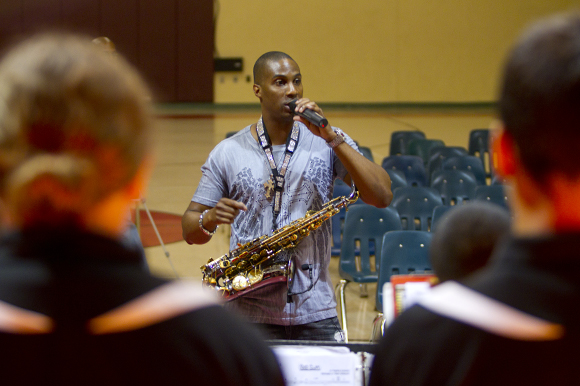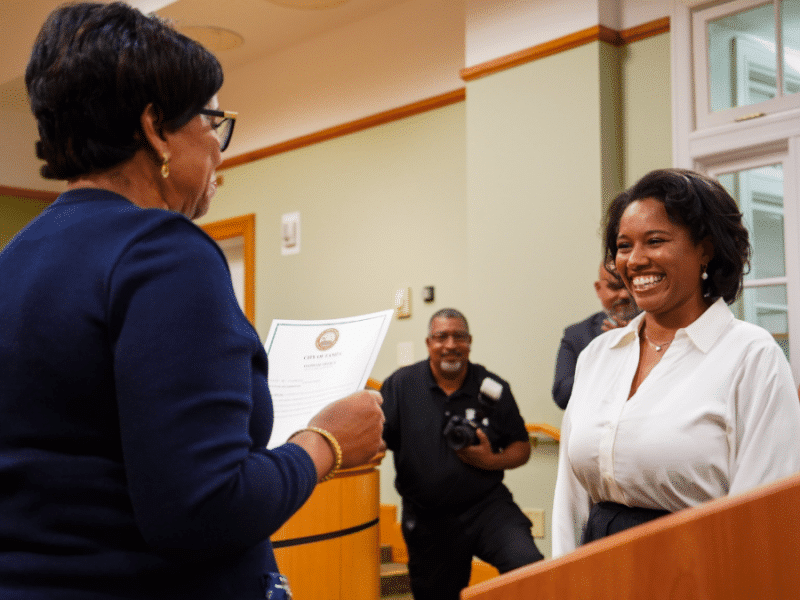On A Mission: Tampa’s Eric Darius Hits All The Right Notes
Eric Darius lets jazz sound his message as he tours schools to remind students that hard work does pay off. The 28-year-old USF marketing graduate has a few records and performances with the likes of Prince to prove it. That’s why he’s currently traveling around the nation, starting with Tampa Bay area schools, to champion the importance of music education.
It is fourth period at Progress Village Middle Magnet in Tampa. The gymnasium quickly fills with the sounds of more than half of the school’s 780 students and faculty members filing in.
They are there to see a performance by Tampa-based musician Eric Darius, but most have no idea what to expect.
The gathering erupts into cheers as soon as the music starts. The 28-year-old saxophonist emerges from behind the stage’s heavy red curtain and instantaneously enthralls the crowd with his seat-grooving rendition of Usher’s Billboard Top 10 hit “DJ Got Us Fallin’ In Love.”
Darius works the audience like a true showman — pacing through the rows of chairs and leaping into the bleachers to serenade a gaggle of awestruck students.
It’s not the type of song you would expect from a musician steeped in the stylings of Charlie Parker, John Coltrane and Grover Washington, Jr., but Darius knows he needs to grab an auditorium of young minds by the eyes — and ears — to get his message across.
These days Darius is all about spreading the importance of music education. His national outreach campaign, titled “On A Mission,” launched in the Tampa Bay region with performances at Progress Village, Orange Grove Middle Magnet and Blake High School of the Arts.
His own education in music was planted at an early age by his parents, Serge and Shirley.
“I grew up listening to Al Green, Stevie Wonder, Earth, Wind & Fire,” Darius recalls, “and the excitement and energy they bring to the stage is what captivated me.”
When a 9-year-old Darius became hypnotized by the soulful sound of the saxophone at church, he realized his calling. Things progressed quickly from there. He received his first saxophone for his 10th birthday. A year later, he was touring with Sonny LaRosa and America’s Youngest Jazz Band, including a gig at Switzerland’s Montreux Jazz Festival.
A spot in the music program at Tampa’s Blake High School for the Arts gave Darius the opportunity to hone his craft with band directors Dr. R. Wayne Gallops and Robert Griffin.
Gallops remembers Darius as a kind, sincere kid who frequented his classroom two to three times a day for four years.
“Eric was so conscientious,” Gallops says. “He did everything ten-fold.”
Everything from soccer, basketball and track to marching band and jazz ensemble — it was all about time management, Darius says.
When he got to the University of South Florida in 2001, he focused on two things: academics and music. It was during this period, Darius says, that his career really started to form.
The slow hunt for a record deal picked up when Darius began sending his music to radio promotional companies. Once contact was made, his songs were circulating on radio nationwide and a label expressed interest in seeing him perform live. Once they did, the deal was made.
How To Become A Millionaire
Eric Darius made his label debut on Higher Octave, a sub-label of EMI’s Blue Note Records, with 2004’s “Night On The Town” and three albums since then, including 2010’s “On A Mission.”
Success hasn’t come easily, or without its share of hard work — something he’s quick to share with his captive audience
“Who wants to be a millionaire and have a nice car and house?” he polls. A sea of hands reach toward the rafters. “Well, you won’t get any of that by playing video games or watching television all day.”
Prior to the Progress Village assembly, Darius meets with the school’s 21-piece jazz band. He offers some advice before they rehearse: Practice your scales every single day. Private lessons, he says, are the key to learning how to play an instrument. Listen to the greats — Clifford Brown, Arturo Sandoval, Miles Davis, etc. He even printed out lists of his favorite jazz musicians for each student. You must emphasize the accent marks. Loud means LOUD.
All things they’ve heard on a regular basis from Band Director Robert Chisholm but, as the trumpet section divulges, few abide. Chisholm thinks that’s about to change after Darius’ guidance.
“It’s a quick snapshot of what your dreams can look like,” Chisholm says. “Being inspired by this gets the wheels turning a little bit more.”
When Darius rips into a solo during the band’s initial practice run of Freddie Hubbard’s “Red Clay,” the wheels of the five trumpet players aren’t simply turning. They practically fly off the axis.
“It’s inspiring even if you don’t play saxophone,” seventh-grade trumpet player Lillian Kraack says.
Eighth-grader Krystal Davila can’t stifle a grin as she watches Darius effortlessly maneuver through his improvised solo.
“You could tell there was so much emotion he put into it,” she extols.
Witnessing Darius in action is enough to make seventh-grader Austin Crawford consider switching from trumpet to saxophone.
“He’s like a lightning rod!” says Richard Saez, another eighth-grade trumpet player.
Building A Creative Economy
That tangible buzz of excitement is precisely what these kids need, according to guidance counselor Sharon Seabrooks.
“This is the real deal, not a reality show,” she quips.
Seabrooks, an employee of Progress Village for 31 years, is enthralled with Darius’ ability to get the kids cheering out of their seats for jazz — especially at a time when arts programs are constantly threatened by budget cuts.
Chisholm believes that band not only gives kids direction, it gives them a reason to come to school every day and strive for their personal best. A 90 percent may be an A, he explains, but a band playing at 90 percent doesn’t quite cut it.
“[It] makes them realize we need to go as much towards 100 percent as possible,” he says. “That version of betterment within themselves and their music directly affects their lives and their academics.”
Music National Service CEO and Founder Kiff Gallagher is a passionate advocate for this school of thinking. The critical skills a child develops when he or she struggles with an instrument, writes a song or joins a band are the same ones needed to succeed in the creative economy and solve our greatest future challenges, according to Gallagher in a 2008 Huffington Post op-ed piece.
The benefits aren’t isolated to social skills, either. A 2007 Harris Interactive Poll found that three-quarters of people with household incomes of $34,999 a year participated in music, compared to 83 percent of people with incomes of $150,000 or more.
Darius hopes his passion for learning will continue to inspire. Future school appearances that coincide with Darius’ national concert tour dates are in the works — all at no cost to the schools. The search for a campaign sponsor is currently underway, but for the moment Darius is footing the bill for any extra expenses, according to public relations director Beth Gaddis.
“Eric is all about paying it forward,” she says.
If the jubilant roars coming from the Progress Village gym didn’t make it clear, the impromptu dance party spurred during his closing performance of Cee Lo Green’s “Forget You” did — contemporary jazz gained a few new fans.
“Celebrities don’t fall out of the air,” Seabrooks says, “but they did this time.”
Matt Spencer, a University of South Florida grad, is a native Floridian who enjoys sharing his love for Patty Griffin, browsing produce stands, spending hours in record shops and gawking at the ice cream selection in grocery stores. Comments? Contact 83 Degrees.

















